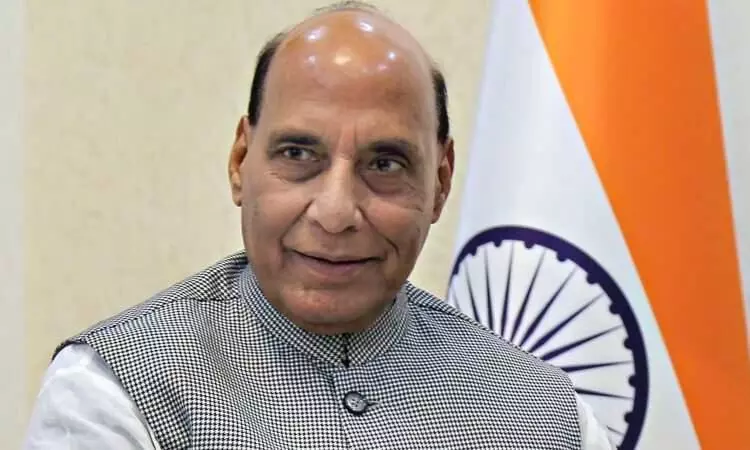
Security situation turning 'complex', need self-reliant defence industry: Rajnath Singh
text_fieldsRajnath Singh, Union Defense MInister
As concerns grow over the Taliban occupation of Afghanistan, Defence Minister Rajnath Singh on Thursday vouched for a strong, capable, and completely self-reliant defence industry in the country to cater to the needs of the armed forces. In the changing geopolitical situation globally, India's security challenges are becoming "complex", he noted. Singh was speaking at the launch of 'Defence India Startup Challenge 5.0', an initiative under the Innovations for Defence Excellence (iDEX) which acts as an umbrella organisation to promote technology development for the defence sector.
"Today, the security scenario in the whole world is changing very fast. Because of this, the challenges to our national security are increasing and becoming complex. There are constant changes in the global geopolitical situation," Rajnath Singh said without making specific references. However, the comment comes in light of the Taliban occupation of Afghanistan. The Taliban started sweeping across Afghanistan after the US-backed government collapsed. It further captured Kabul on August 15, sparking concerns across the globe.
"It is necessary that we not only create strong, modern and well-equipped forces, but also develop our defence industry, which is equally strong, capable, and most importantly, completely 'self-reliant'," the Defence Minister said.
Calling upon the private sector to contribute to strengthening the defence sector, he said, "While assuring all possible cooperation from the government, I call upon the private sector to come forward and contribute in building a strong and self-reliant defence sector."
"There is neither a shortage of talents in our country, nor is there a lack of demand for talents. But in the absence of a common platform, the two could not match. 'iDEX' platform has been successful to a large extent in bridging this gap," he said.
The government has been attempting to make India a defence manufacturing hub in the last couple of years through a series of reform measures and initiatives. Last August, the defence minister announced that India would stop importing 101 weapons and military platforms like transport aircraft, light combat helicopters, conventional submarines, cruise missiles, and sonar systems by 2024.
Then again, recently, a second negative list imposing import restrictions on 108 military weapons and systems such as next-generation corvettes, airborne early warning systems, tank engines and radars, was issued. Furthermore, the government increased the FDI limit from 49 per cent to 74 per cent under the automatic route in the defence sector in May last year. The government has been attempting to reduce reliance on imported military platforms and support domestic manufacturing.
The defence ministry has set a goal of a turnover of USD 25 billion (Rs 1.75 lakh crore) in defence manufacturing by 2025 that included an export target of USD 5 billion (Rs 35,000 crore) worth of military hardware.












